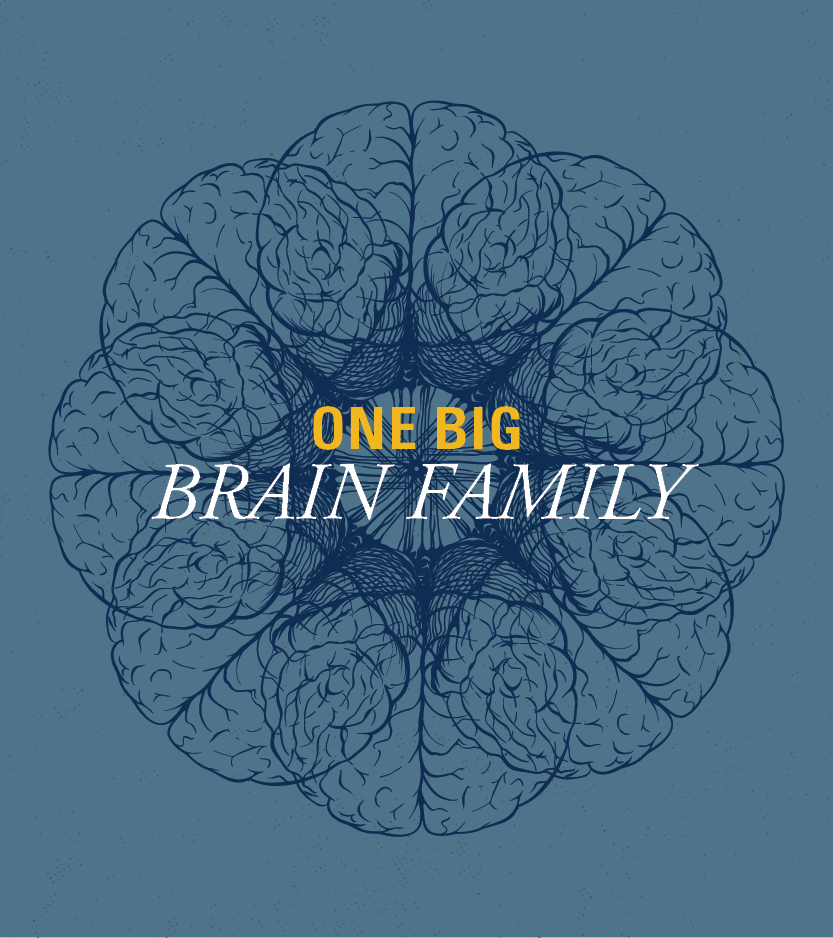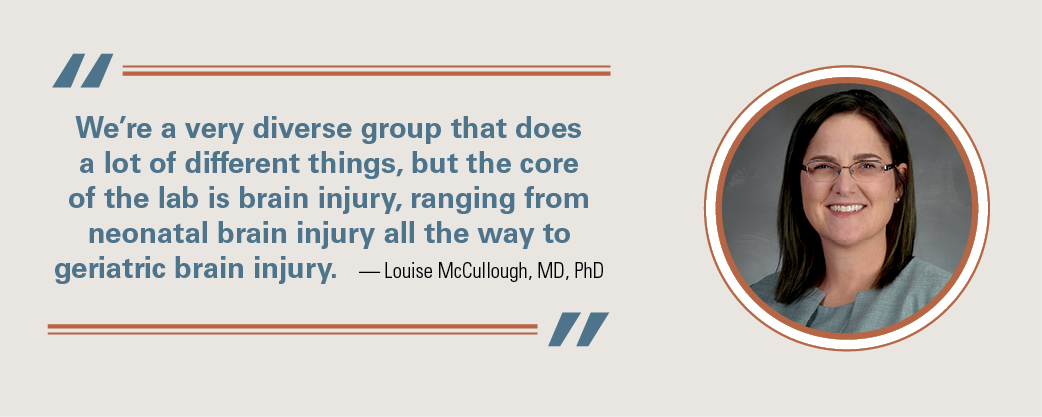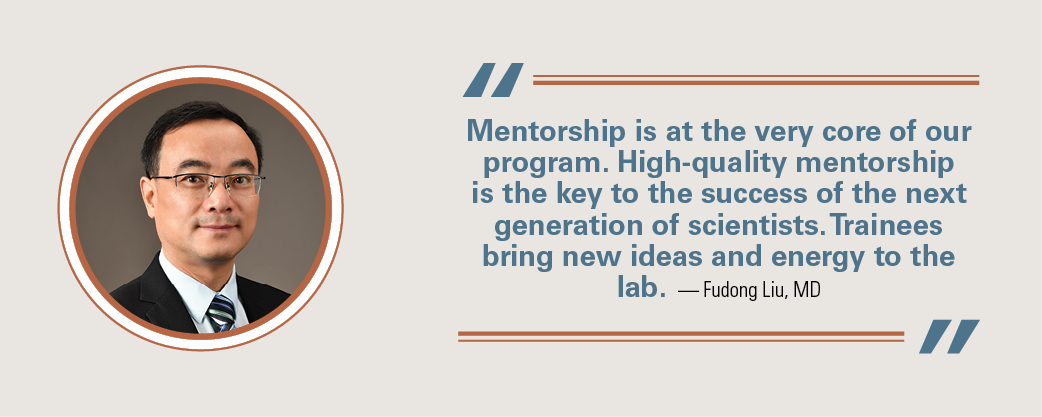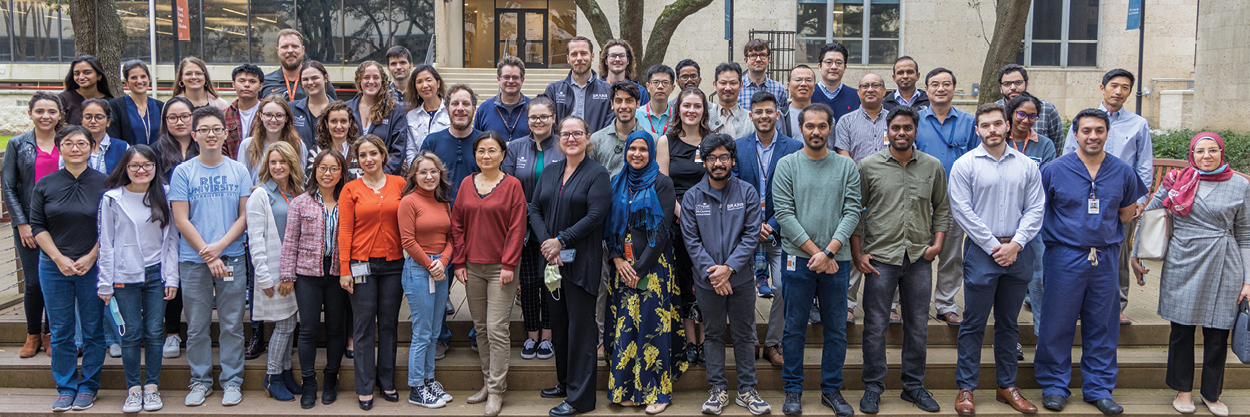Perhaps one of the biggest mysteries of the human body is the brain and how it functions. According to the National Institutes of Health, funding for neuroscience has more than doubled since 2013 as scientists work to unravel some of the biggest challenges of one of the body’s most vital organs.
 At McGovern Medical School, the BRAINS Research Laboratory, led by Louise McCullough, MD, PhD, professor and Roy M. and Phyllis Gough Huffington Distinguished Chair in the Department of Neurology, and chief of neurology at Memorial Hermann – Texas Medical Center, is helping to lead that research forward and into the future.
At McGovern Medical School, the BRAINS Research Laboratory, led by Louise McCullough, MD, PhD, professor and Roy M. and Phyllis Gough Huffington Distinguished Chair in the Department of Neurology, and chief of neurology at Memorial Hermann – Texas Medical Center, is helping to lead that research forward and into the future.
Thirteen principal investigators house more than 50 researchers across their labs under the umbrella of the BRAINS Research Lab. The multifaceted group holds interests ranging from the core focus of stroke to aging, inflammation, recovery, neuro-degeneration, vascular dementia, and sex-differences.
“We’re a very diverse group that does a lot of different things, but the core of the lab is brain injury, ranging from neonatal brain injury all the way to geriatric brain injury,” McCullough said. “We’re a large, but very cohesive group. We’re about the same size of some small basic science departments, so we really function like that. We have expertise in many different techniques and lots of equipment that we are happy to share with others to support the research and educational missions of UTHealth Houston.”
The BRAINS Research Lab formed in 2015 after McCullough relocated from Connecticut to Houston and has nearly doubled in size since its inception, with the total number of principal investigators growing from five to 13 in less than six years.
“As a result (of the growth), the productivity of the lab has increased enormously, as measured by both number of publications and extramural funding,” said Fudong Liu, MD, associate professor and principal investigator of the Liu Lab. “The lab has become truly multi-disciplinary, reflecting the full name of the group; BRAINS: brain, rejuvenation, aging, inflammation, neurodegeneration, and stroke.”
The BRAINS Lab receives around $8.3 million in annual direct funding to study challenges like ischemic stroke, cerebrovascular dementia, the gut-brain axis, blood brain barrier physiology, traumatic brain injury, neonatal hypoxia-ischemia, and more. The lab has amassed $44.1 million in total funding. Apart from their own labs, a key component to the makeup of the lab is their collaboration with outside groups.

“We try to collaborate with lots of different departments and individuals,” McCullough said. “We share all our core equipment and try to provide expertise to people if they aren’t familiar with some of the techniques we use. One of the things that makes us unique is that we’re very translational.”
Additionally, the lab uses its resources to create bio banks for scientists outside the BRAINS umbrella. In March 2020, the lab created a COVID-19 bio bank with samples collected from a diverse population of Memorial Hermann – TMC patients, which will help scientists studying long-haul COVID or how COVID-19 affects the brain chronically. Faculty in various departments have used this core resource to submit grants for extramural funding over the past year.
“The whole group is so multi-disciplinary, we have even more opportunities to collaborate with each other to expand our research fields,” Liu said. “Every primary investigator has his/her own expertise, which is the most precious asset to everyone in the lab and throughout UTHealth Houston.”
That cohesive collaboration among the labs under the BRAINS umbrella is helping to prepare for the future of brain research as well.
“Mentorship is at the very core of our program,” Liu said. “High-quality mentorship is the key to the success of the next generation of scientists. Trainees bring new ideas and energy to the lab.”
Beginning in high school, students can train with the BRAINS Research Lab as part of the BRAINS Summer Research Program. Established in 2016, the BRAINS Research Lab welcomes high school, undergrad, and gap-year students. The 10-week program pairs participants with an experienced scientific mentor and assigns each with a research project, offering exposure early to pique their interest in subsequent research careers.
The program recruits students from all across the country and represents a diverse population, with at least 40 percent from groups traditionally underrepresented in science. The program affords students the opportunity for early exposure to science, establishing the skills for success.
“The summer program has been very successful,” McCullough said. “Over 100 students have gone through it, and about 98% have gone on to MD, PhD, or MD/PhD training. We’ve kind of developed a pipeline to keep people involved in translational science.”
That pipeline also extends back to the BRAINS Lab, which now has more than a dozen gap-year students working in the lab as they take a year before deciding if they want to go to graduate or medical school. Gap-year students in the lab work as research assistants and have the opportunity to publish, enhancing their application for further graduate training.
The lab also understands that training and learning doesn’t stop once you finish your graduate education. Mentorship opportunities also exist for junior faculty and postdoctoral fellows in how to write and review grants, so they can be successful as future independent investigators.

“Led by Dr. McCullough, the BRAINS Lab has helped produce a large number of clinician-scientists and translational researchers,” Liu said. “We have mentored clinician-scientists, PhDs, MDs, pharmacists, and students at all levels of training, from high school to junior faculty. These trainees have spread all over the United States and overseas. The unique mentoring that is the cornerstone of Dr. McCullough’s style, which we have all adopted, can be summarized in four words: optimism, patience, encouragement, and rigor.”
As the lab marches forward, racing to answer the age-old question of how the brain works, they will continue to grow — adding a 14th principal investigator in April 2022 — and will continue to shape the minds and careers of future scientists.
